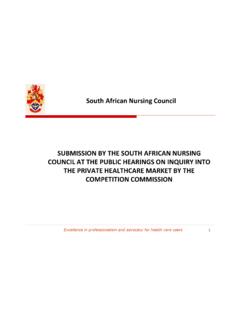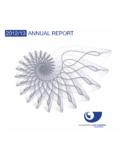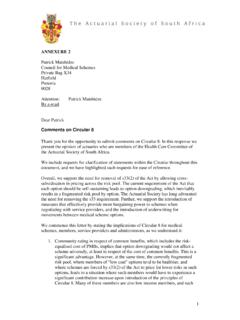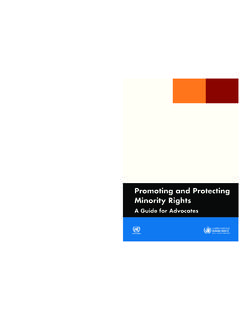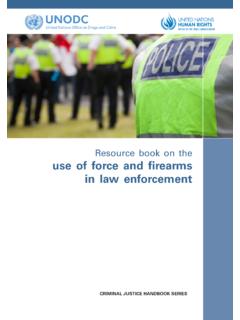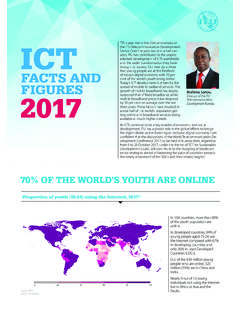Transcription of Are Southern African competition law regimes …
1 Any views or opinions expressed are solely those of the author and do not represent those of the South African competition Commission. Page 1 Are Southern African competition law regimes geared up for effective cooperation in competition law enforcement? Nelly Sakata1 1. Introduction The importance of cooperation amongst competition agencies has been highlighted recently with more and more agencies formalising this cooperation through international agreements with their Closer to home, this need for cooperation has been reflected in the 2002 Southern African Customs Union (SACU) Agreement, the 2004 COMESA competition Regulations and the 2009 Southern African Development Community (SADC)
2 Declaration on regional cooperation in competition and consumer policies which all provide for cooperation between member states in the area of competition law enforcement. These initiatives were premised on the recognition that there was a need for increasing regional cooperation in tackling cross-border anti-competitive practices. Thus far the implementation of these instruments has been faced with a number of challenges. For instance the exchange of information between agencies, while a key 1 Nelly Sakata is a Senior Legal Counsel within the Legal Services Division of the competition Commission of South Africa.
3 2 Noteworthy agreements include those between: - Australia Cooperation Agreement (June 1982), - Australian Mutual Antitrust Enforcement Assistance Agreement, - Brazil Cooperation Agreement (October 1999), - Canada Cooperation Agreement (August 1995), US - Chile Agreement on Antitrust Cooperation (March, 2011), China Memorandum of Understanding on Antitrust and Antimonopoly Cooperation (July 2011), - Germany Cooperation Agreement (June 1976), - Commission of the European Communities Cooperation Agreement (September 1991), US - EU Merger Working Group, Best Practices on Cooperation in Merger Investigations (October 2002), - Israel Cooperation Agreement (March 1999), - Japan Cooperation Agreement (October 1999), - Mexico Agreement (July 2000), OECD Recommendation on Cooperation Between Member Countries (July 1995).
4 Any views or opinions expressed are solely those of the author and do not represent those of the South African competition Commission. Page 2 aspect of cooperation, is often restricted by issues relating to the protection of confidential information. Whilst some competition authorities recognise that a corporate leniency policy is an important driver of cooperation between competition authorities, there are at present very few fully functioning leniency programmes in place in the region. In addition the analysis of cross-border mergers also raises challenges in particular where there are regional effects.
5 As such, apart from cooperation with regard to capacity building, there seems to be very little cooperation among member states of either of these regional institutions in the area of enforcement. This paper explores some of the obstacles to effective regional cooperation in competition law enforcement within the Southern - African region. It also makes suggestions as to how these challenges can be overcome. The paper also looks at various instruments of regional cooperation in competition law, specifically the SADC declaration, SACU Trade Agreement and COMESA competition rules, as well as the regional cooperation instrument between EU member states.
6 2. Significance of cooperation Globalisation has not only enhanced competition , but has also increased the geographical reach of business transactions and with that the international impact of anti-competitive Given the global dimension of competition issues and the harm of cross-border anti-competitive practices, cooperation between competition authorities has become increasingly important. International cartels, for instance, have been found to have a significant negative impact on developing Levenstein and Suslow report that in 1997, the value of the cartel-affected imports to developing 3 UNCTAD s Background paper on the review of the experience gained so far in enforcement cooperation, including at the regional level TD/B/CJ/CLP/10 (page 3, paragraph 5).
7 4 UNCTAD s Background paper on the review of the experience gained so far in enforcement cooperation, including at the regional level TD/B/CJ/CLP/10 (page 12, para 56). Any views or opinions expressed are solely those of the author and do not represent those of the South African competition Commission. Page 3 countries was estimated at US$51,1 billion, which was said to be higher than the amount of foreign aid given to developing countries: US$39,4 competition authorities around the world recognise the importance of cooperation in investigating and prosecuting cross-border practices restricting For example, the competition authorities have noted that lack of cooperation mechanisms hinders effective competition law enforcement.
8 7 The Canadian, European and competition authorities have also cited international cooperation specifically for enabling increased prosecution of cartel activity and greater merger review coordination. 8 Cooperation in combating anti-competitive practices, whether resulting from international cartels or cross-border mergers, has a number of benefits. An International competition Network ( ICN ) report on cooperation between agencies in cartel investigations identifies the following benefits:9 At the pre-investigation stage: agencies can notify each other of investigations of cartels that may have an effect in the jurisdictions of their counterparts; the various jurisdictions can also agree on specific markets and companies to be investigated.
9 During the investigation stage: agencies could coordinate their investigative strategies, for instance, conducting simultaneous raids, issuing of summons or interrogating the parties; 5 Levenstein and Suslow - Contemporary International Cartels and Developing Countries Economic Effects and Implications for competition Policy - Antitrust Journal, Vol 71, 6 (Information accessed on 15 September 2011) 7 ABA Section of Antitrust Law International Antitrust cooperation Handbook (2004) page 2. 8 Ibid. 9 International competition Network (ICN) Cartels Working Group Cooperation between agencies in cartel investigations Report to the ICN Annual Conference (Moscow May 2007) page 7.
10 Any views or opinions expressed are solely those of the author and do not represent those of the South African competition Commission. Page 4 At the post-investigation stage: the agencies could share information about their prosecution strategy or possible settlements and remedies to be Cooperation in the case of cross-border mergers can have benefits for both parties and competition agencies. A wish list provided by private practitioners at a recent United Nations Conference on Trade and Development ( UNCTAD ) meeting reveals that parties hope that cooperation amongst competition agencies will lead to more coherence in:11 substantive analysis of cases; process and timing; information requests.
